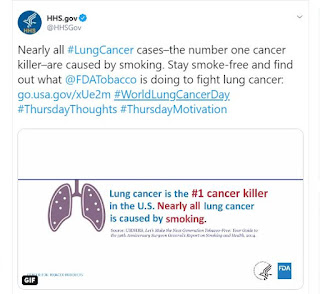 |
| The well-intentioned Twitter post that inspired this post. |
Patients who smoke are subjected to medical bias & neglect for years pre-diagnosis under the erroneous assumption that they don’t care about their health. It is an easy assumption to make, and during my father’s illness I saw it in medical professionals of all kinds. Since then, in 6 years of education & clinical training, I have seen it come up again, and again, and again — with devastating impacts.
It isn't hard to understand why medical professionals exhibit bias toward smokers. It is a key risk factor or cause for a panoply of illnesses.
What is much harder to understand is why so many people still smoke.
Why, even after it begins to cause problems, do so many people keep smoking and bat away nudges to quit with seemingly nary a thought? As a former smoker celebrating 8 years smoke-free this December, I can tell you.
Because quitting smoking is really hard!
And unfortunately, starting smoking is very easy, especially for young, impressionable folks with limited coping skills, or no support. When you’re young that rush of excess nicotinic activation feels like profound relaxation. Calm.
There is nothing that calms you down faster or more reliably than that first drag on a cigarette. Even though the longer you smoke the less good it feels, it becomes a crucial, quick-acting coping mechanism that is extremely hard to replace.
When you try to quit, it’s hell.
It’s like an evil gremlin lives in your mind and never talks about anything except smoking. The longer you’ve been smoking in pack years, the louder he is. Medications like Wellbutrin can help with the gremlin, but as with so many things medical, cost & access are a problem. Besides the gremlin, without medication or nicotine replacement you rapidly start to feel like an insane person. By the afternoon of the first or second day you are grouchy in a way that is almost impossible to control (ladies, think the worst PMS ever) and snapping at everyone.
People who love you and who you love back will literally ask you to smoke.
That sounds ridiculous, right? Who would do that? Unfortunately, it happens all the time. The first time I ever tried to quit — just a few months after my first cigarette — my boyfriend got so sick of my attitude he asked me to please smoke a cigarette. Up until that moment, I didn’t even know what a “nic-fit” was, but you better believe that at eighteen years old when I heard that the reason I had been feeling like a murderous psychopath all day was simply for lack of one little cigarette, I lit up faster than you can say “No shit?” After all, I didn't smoke that much. I wasn’t really addicted, I could quit any time.
Yes, so dumb, but that's what I thought. via GIPHY
I kept smoking for eleven years and during that time I heard and was told hundreds of times how bad it was to smoke and how stupid it was and oh my gawd how can you stand the smell of it, but you know what no one ever told me?
That the nicotine rush I was experiencing was hypertension.
That every time I lit up, I was inducing a stress reaction in my own body that was intended to prepare me to remain calm while I did whatever was necessary to survive attack.
That this same stress reaction was smashing every bit of cholesterol in my blood into the walls of my arteries with every single heartbeat.
That the reason I coughed was because the tissue in my trachea had adapted to the constant assault of cigarette smoke by literally mutating into a different kind of tissue that couldn’t move anything out of my lungs without the assistance of a cough.
We don’t talk to smokers.
At least, we don’t talk to them like intelligent human beings who can understand & mitigate the consequences of their own actions when empowered with the knowledge all medical professionals must earn/maintain/update via enormous personal and financial sacrifice. We talk to them like losers who already understand perfectly well why they don’t feel good and choose it because god-knows-why-not-my-problem.
IT IS BULLSHIT.
Stop telling people smoking kills you. NO SHIT. WE KNOW.
How about instead you tell us HOW to slay the gremlin? How about you take the time to explain to a smoker who may come from a family with absolutely no energy or resources to spare toward wellness because they are just trying to survive exactly what is happening inside their bodies and why it is that "everyone says" smoking is bad.
This is basic Maslow’s hierarchy of needs, and we have all been educated to know better. It is our responsibility as healthcare providers to use that education to help our patients as much as we possibly can, even if we have our own gremlins with nasty things to say about smokers. Step one is admitting the gremlins exist and they are influencing our behavior. Step two is doing something about it. Congratulations on finishing this read instead of clicking away the first time you saw yourself in it. Your step two has already begun.
This content has been edited and supplemented from it's original format here and republished as a blog.
For more content by Kelly Clark, DPT, PT, MT, visit PT For The People's sister LLC, Patient PT.